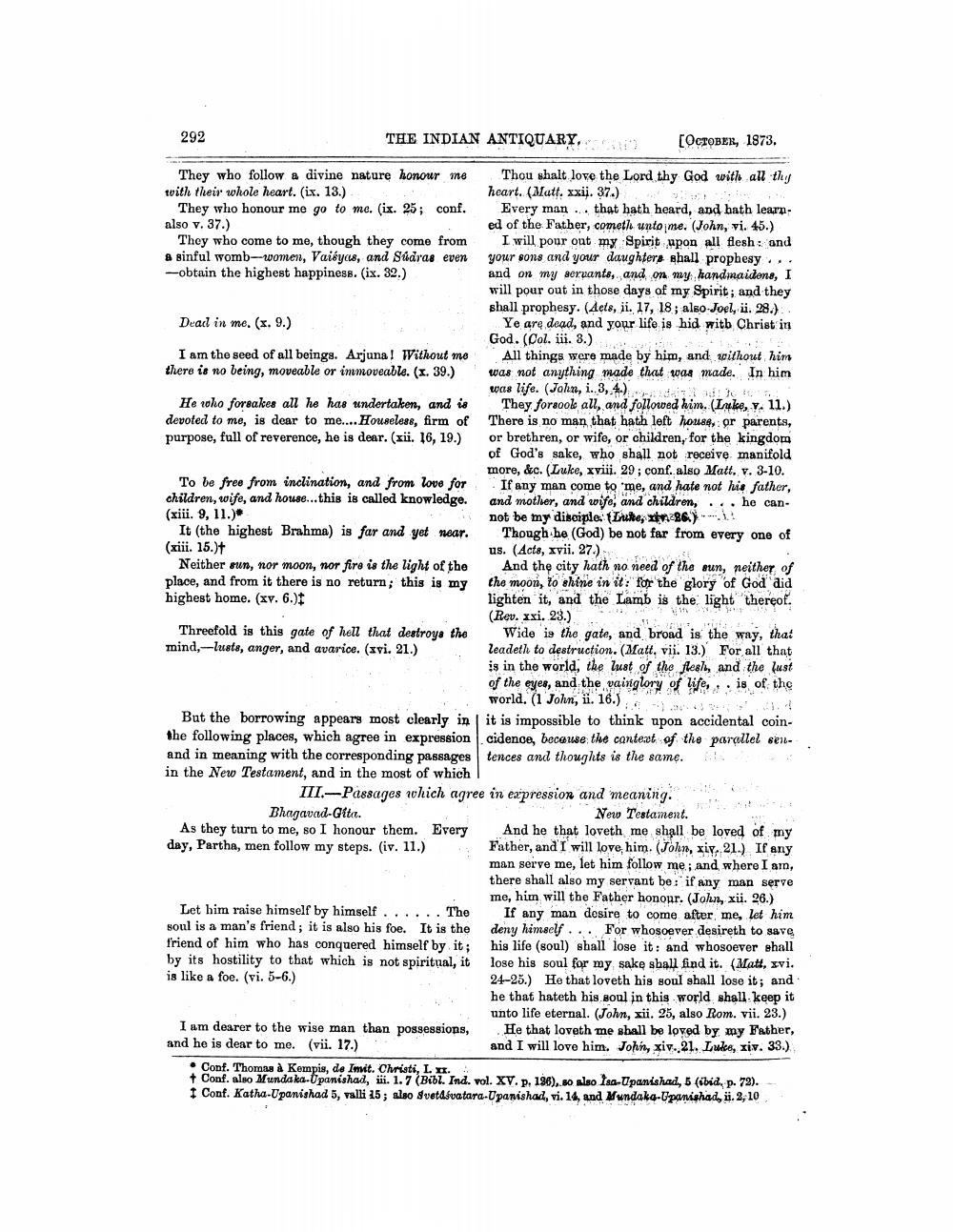________________
292
THE INDIAN ANTIQUARY.
[OCTOBER, 1873.
VW
They who follow a divine nature honour me Thou shalt love the Lord thy God with all thy with their whole heart. (ix. 13.)
heart. (Matt. xxij. 37.) They who honour me go to me. ix. 25; conf. Every man that hath heard, and hath learn. also v. 37.)
ed of the Father, cometh unto me. (John, vi. 45.) Thoy who come to me, though they come from I will pour out my Spirit apon all flesh: and a sinful womb--women, Vaisycs, and Sudras even your sons and your daughters shall prophesy... -obtain the highest happiness. (ix. 32.)
and on my aeruants, and on my handmaidons, I will pour out in those days of my Spirit, and they
shall prophesy. (Aets, ii. 17, 18; also Joel, i. 28.) Dead in me. (x. 9.)
Ye are dead, and your life is hid with Christ in
God. (Col. iü. 3.) I am the seed of all beings. Arjuna! Without me All things were made by him, and without hin there is no being, moveable or immoveable. (I. 39.) was not anything made that was made. In him
was life. (John, 1.3, 4.) diri He roho forsakes all he has tendertaken, and is They forsook all, and followed him. (Luke, v. 11.) devoted to me, is dear to me.... Houseless, firm of There is no man that hath left house, or parents, purpose, full of reverence, he is dear. (xü. 16, 19.) or brethren, or wife, or children, for the kingdom
of God's sake, who shall not receive manifold
more, &c. (Luke, xviii. 29; conf. also Matt. v. 3-10. To be free from inclination, and from love for If any man come to me, and hate not his father, children, wife, and house...this is called knowledge and mother, and wife, and children, ... he can(xiii. 9, 11.)
not be my disciple. (Inike, In286) - It (the highest Brahma) is far and yet near. Though he (God) be not far from every one of (xiii. 15.)+
us. (Acts, xvii. 27.) Neither sun, nor moon, nor fire is the light of the And the city hath no need of the sun, neither of place, and from it there is no return; this is my the moon, to shine in it for the glory of God aid highest home. (xv. 6.)
lighten it, and the Lamb is the light thereof.
(Rev. xxi. 23.) Threefold is this gate of hell that destroys the Wide is the gate, and broad is the way, that mind-lusts, anger, and avarice. (xvi. 21.)
leadeth to destruction. (Matt. vii. 13.) For all that is in the world, the lust of the flesh, and the fust of the eyes, and the vainglory of life, , . is of the
world. (1 John, ii. 16.) ) But the borrowing appears most clearly in it is impossible to think upon accidental cointhe following places, which agree in expression.cidence, because the content of the parollel senand in meaning with the corresponding passages tences and thoughts is the same. in the New Testament, and in the most of which
III.--Passages which agree in expression and meaning. Bhagavad-Gita.
New Testament. As they turn to me, so I honour them. Every And he that loveth me shall be loved of my day, Partha, men follow my steps. (iv. 11.) Father, and I will love him. (Jolin, xiv, 21.) If any
man serve me, let him follow me; and where I am, there shall also my servant be: if any man serve
me, him will the Father honour. (Jolu, xu. 26.) Let him raise himself by himself ... ... The If any man desire to come after me, let him soul is a man's friend; it is also his foe. It is the deny himself ... For whosoever desireth to save friend of him who has conquered himself by it; his life (soul) shall lose it: and whosoever shall by its hostility to that which is not spiritual, it lose his soul for my sake sball find it. (Matt, xvi. is like a foe. (vi. 5-6.)
24-25.) He that loveth his soul shall lose it; and he that hateth his soul in this world shall keep it
unto life eternal. (John, xii. 25, also Rom. vii. 23.) I am doarer to the wise man than possessions, He that loveth me shall be loved by my Father, and he is dear to me. (vii. 17.)
and I will love him. John, xiv, 21. Like, xiv. 33.) • Conf. Thomas & Kempis, de Imit. Christi, L. II. + Conf. sloo Mundaka Upanishad, ii. 1.7 (Bibl. Ind. vol. XV. p. 186), ko sloo fra Upanishad, 5 (ibid, p. 73). 1 Conf. Katha Upanishad 5, valli 25; also svetdívatara Upanishad, vi. 14, and Mundaka-Upanishad, ii. 3, 10




